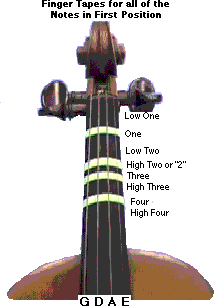Click here to go to www.mrfiddle.com

Click here to go to www.mrfiddle.com

All violin pieces are written in one of 12 Major or 12 minor keys. Scales give practice for your ears as well as your fingers. You will probably find some keys very easy, and some keys very difficult. (That's why beginning violin pieces are usually written in A Major instead of Eb minor!) It is a good idea to practice the same scale every day for a week before going on to the next one. There are many other ways to "finger" these scales. The fingerings that have been shown on these pages are the ones that I feel will be the easiest for the beginning student to understand. When you study more advanced scales from a scale study book, you will see different fingerings coming back down the scale then you had going up. And, you will also see different notes going up the melodic minor scales from the ones going down. Sound confusing? Just keep practicing in SMALL STEPS! Learning the violin is a life-long adventure and you're never to old to learn something new.
Click here to
go to www.mrfiddle.com
The longest journey starts with the first step!
You're never too old, or too good a player to not practice your scales every day!